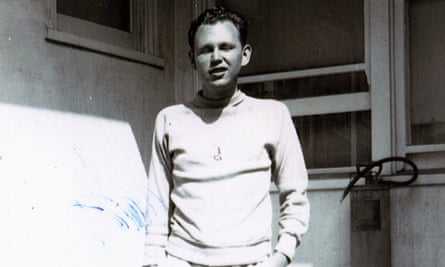 |
| ‘Poems are my salvation alone’ … John Wieners. Photograph: Allen Ginsberg |
‘We exist upon the fringe of the world’: the queer American poets who battled madness and obscurity
Jack Spicer and John Wieners both wrote about their homosexuality – and in 50s America, that made them a threat. Forgotten for decades, finally their strange, anguished work has been unearthed
Ralf Webb
Monday 3 July 2023
In mid-century America, avant garde and alternative poetry was considered subversive, dangerous and hostile. To write and publish poems about drugs and sexuality, or poems with anti-nationalist, anti-war sentiment, was to attract suspicion from the authorities. It may have even landed you in prison: Amiri Baraka and Diane Di Prima were among many poets arrested on obscenity charges. Predictably, such subversive writing was often rejected by mainstream publishers – the result being that a lot of great poets and their work fell into obscurity.
Pilot Press, an imprint founded to “retrieve a philosophy of publishing lost to Aids and capitalism”, is attempting to remedy this with two publications: A Book of Music by Jack Spicer and Solitary Pleasure: Selected Poems, Journals and Ephemera of John Wieners. Spicer and Wieners were mid-century American poets and their work appeared in the groundbreaking The New American Poetry anthology, published in 1960. This collection defined a post-second world war generation of avant garde poets, from John Ashbery to Jack Kerouac, who were linked by a shared disillusionment with the hierarchies of the literary establishment. Spicer belonged to the Beat-adjacent San Francisco Renaissance, where he presided over an experimental reading group named The Dharma Committee, which, fuelled by narcotics, attracted the attention of the FBI. Wieners was part of an emergent set of peripatetic poets who vagabonded between different artistic spheres, as comfortable among Spicer’s north California coterie as he was alongside the New York School’s “artworld cocktail ballet scene”, as Allen Ginsberg described it.
Spicer and Wieners were queer men who wrote about queerness during the US’s Lavender Scare, a cultural moral panic which made “homosexuality” metonymic with “national security threat”. To be queer was to be mentally ill, deviant, perverted: to be queer was to be a literal and figurative outlaw. In this sense, Spicer and Wieners lived lives of precarity and nonconformity, their day-to-day tinctured by a psychic terrorism surely impossible to imagine. “We exist upon the fringe of the world,” Wieners wrote in Prose Poem, “small bright fragments that somehow burn away the fire’s edge.” It is tempting, though reductive, to see their fates as resulting solely from this marginality: Wieners, after years of drug misuse, spent the 60s in and out of mental institutions, where he was subjected to the hell of electroconvulsive therapy; Spicer died in the poverty ward at San Francisco General hospital, in 1965.

Solitary Pleasure is a selected collection of Wieners’ poems, appended with letters and journal entries. An introduction, written by contemporary poet Nat Raha, makes a powerful case for reading Wieners’ work as art born from “the heart of struggle”. The poems themselves are offhand and diaristic. Sometimes, they deploy childlike rhymes that purposely steer close to nonsense, successfully generating a sense of wonder (“If I had a canoe / I’d fill it with you / Then what would you do”). The Wieners of Solitary Pleasure is a poet eager to vocalise queer desire. “The beauty of men never disappears,” he writes, later portraying desire as something that must be “choked” out of him. Occupying nearly a third of Solitary Pleasure are his “Asylum Poems”, which Wieners wrote in 1969 – the summer of the Stonewall riots – while in a psychiatric institution. These poems spotlight the connection between art and affliction, but challenge us to consider creative expression as a very real mode of survival and salvation, and not merely, as current wellness discourses suggest, a potential curative or preventive to mental ill-health.
Spicer’s A Book of Music – a 14-poem pamphlet – is reissued without commentary or contextualising ephemera. The poems are weird songs which trouble the connection between sound and sense, suggesting that poetic utterance is a music – “a tree growing just behind my throat” – that can rearrange our relationship to reality and the objects in it. This mysterious pamphlet makes for a fitting introduction to Spicer, who dabbled in bibliomancy and tarot and considered the poet a “radio” capable of receiving missives from another realm. For Spicer, poetry could also be a “collage of the real” – as though the form could trap life and foil decay. In this context, Spicer’s assessment of Wieners – or “Hotdog”, as he sometimes referred to him – seems a high compliment: “Bright coloured bits of reality stick to him,” Spicer wrote after seeing Wieners’ perform in 1959.
Rarely was Spicer so generous. A fierce regionalist, he reviled the notoriety achieved by his contemporaries, believing that fame is anathema to artistry, that success defangs a poet’s truth. Therefore, Ginsberg’s Howl – “the best-publicised poem in the world”, according to Spicer – was “crap”. Frank O’Hara he dismissed as a “third-hand Rimbaud”. Spicer was also a misogynist – not especially surprising in a poetic demimonde formed almost exclusively of men – and a venomous racist and antisemite. The latter found expression in a paranoid, sometimes wholesale rejection of New York, where he thought Jewish people ran the poetry and “homosexual” networks.
To recover poets from the past, poets whose unimaginable nonconformity contributed to their contemporary obscurity, is a necessary task. How we read those poets – particularly if we hope their work might help us navigate our own precarious present – is more complex. Perhaps the challenge is to do so with care and without sentimentality. Or should we defer to the poets themselves? “Poems,” wrote Wieners, several months before he was first institutionalised, “are my salvation alone. The reader can do with them what he likes.”


No comments:
Post a Comment